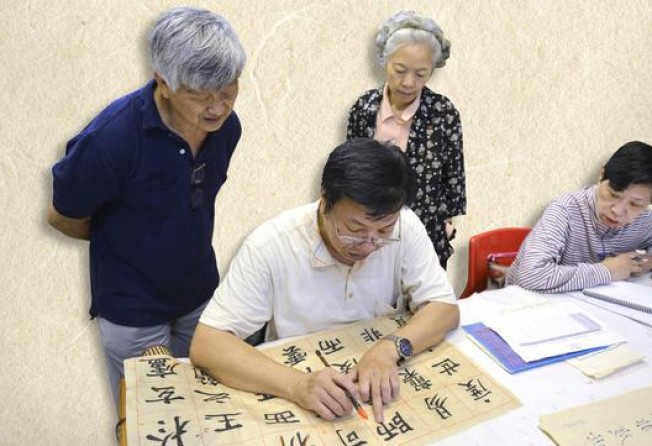Opportunities exist, but the elderly need more options for study
More opportunities are needed for people to study during retirement

Last month, Chris Uphill, 65, retired from the ESF Educational Services, an organisation he joined after teaching at ESF Glenealy Primary School. As he returns home to Britain after 25 years in Hong Kong, he is looking forward to pursuing a master of education at the Open University.
"Although I am retiring, I retain my professional interests, and still want to pursue these. Retirement provides the two essential prerequisites for study - financial independence and time. I'm not ready for the armchair and the pipe," Uphill says.
He epitomises a rising number of retirees who are seeking continuous fulfilment in life. But he is one of the fortunate ones who can consider engaging in formal education after retirement.
Although lifelong learning includes formal, non-formal and informal learning, the scope available to the elderly is narrow, and mostly restricted to informal leisure courses.
These are offered by the Elder Academies that were established in each of Hong Kong's 19 geographical constituencies by the government in 2007, through its Elderly Commission in response to rising trends and increasing demand for learning opportunities among the elderly.
The government's involvement is restricted to making seed funding available to private and public providers, to establish academies, which run on a self-financing basis and are free to design their own curricula.
School-based academies in each district promote intergenerational learning and interaction between old and young, where courses are taught by the young to the old and vice versa.
Maureen Tam Siu-ling, an associate professor of international education and lifelong learning at the Hong Kong Institute of Education, says lifelong learning is a continuous process that spans the entire course of one's life. Implicit in the notion is the need for all citizens to have equal access to programmes and activities.
Shue Yan University responded to the call of the Elderly Commission and applied for a grant of HK$100,000 to launch its Summer Elder Academy in May 2008. Courses held this year in summer included Chinese art, five elements and nutrition diet, tai chi, understanding acupuncture points and computer literacy.
Joyce Chang Sau-han, who heads the department of social work, says the courses were initiated after listening to suggestions from the community.
Elder student Fanny, from the calligraphy group, says: "The technique can help me to focus and concentrate for a longer period of time." Another student, Anna, says she has "more new friends of her age, has widened her social circle, increased her social awareness and become a volunteer in community service".
There is no official definition of an "elderly person". But based on benefits granted by the government and mandated retirement polices, reaching the age of 60 is widely accepted as becoming "elderly".
According to the 2010 Census and Statistics Department figures, the rate of people ageing will accelerate from the ratio of one in eight citizens aged 65 or above in 2009, to 28 per 100 by 2039.
The School of Professional and Continuing Education of the University of Hong Kong shows a rising trend for elderly people between the ages 60 to 64 to participate in continuing education. Enrolment figures from the Open University of Hong Kong reveal that each year 4 per cent to 5 per cent of students across its four schools are over the age of 45, and include retirees.
But these tertiary institutions, unlike the Elder Academies, do not make provisions to subsidise the education of elder students enrolled in the courses. Only a few courses jointly run by Elder Academies and Hong Kong's tertiary institutions allow elder learners to enrol in their regular undergraduate courses as auditing students. But these students do not take part in any assessment, and cannot earn credits towards the formal qualification that Uphill seeks.
Uphill is hoping to pay a £6,500 (HK$78,700) fee under his "home status", and not £14,500 that is normally charged to international students. This is considerably less than what he would have paid had he undertaken a similar course at the University of Hong Kong (HK$96,000).
The Elder Academy learning model is claimed by the Elderly Commission to be unique to Hong Kong. But outside of Hong Kong there exists a plethora of both similar and different models. Elder learning in Europe developed in the 1970s with the formation of the University of Third Age (U3A) in Toulouse.
This "French" model required association with traditional universities and negotiated access to regular university courses. The first British U3A was established in association with Cambridge University in the early 1980s. This model has since adopted a community-based approach that is run by its own elected management, and is characterised by minimal membership fees, accessible classes in community halls and libraries, flexible timetables, wide course variety and no examinations.
Tam says: "The Elder Academies network represents a notable change in governmental policy and practice in elder learning as compared to the unco-ordinated approach before the network was established."
But the sprawling network is not without problems. There is little co-operation between Elder Academies in different districts, and this results in the duplication of programmes and an insufficient range of courses.
While recognising that the network is a significant step in the right direction towards the support and provision of elder learning, Tam points out, "there is need for a shift from the informal sphere to the formal arenas of provision, where elder learning is seen as the responsibility of public institutions".
"There is a need to put into place policies and programmes that support lifelong learning as a necessity for people, regardless of age, ability and background to engage in simply because they have the natural ability to learn.
"[They have] the right to keep learning throughout their life, as well as interact with others in society for personal growth and social development," Tam says.